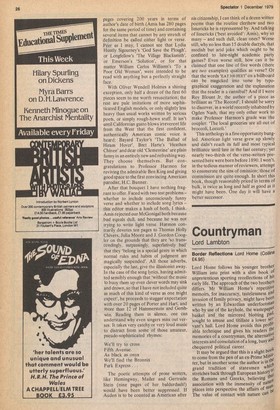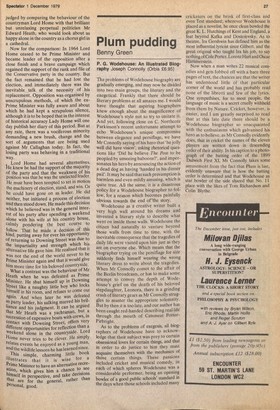Countryman
Lord Lambton
Border Reflections Lord Home (CollinS e4.95) Lord Home follows his younger brother William into print with a slim book of unpretentious sporting recollections of his early life. The approach of the two brothers differs. Mr William Home's repetitive memoirs, for inaccuracy, tastelessness and invasion of family privacy, might have beell written by an Edwardian underfootmiol who by use of the keyhole, the wastepapel basket and the mirrored blotting pads sought to amuse and titillate a lower ser vant's hall. Lord Home avoids this profit' able technique and gives his readers tile memories of a countryman, the alternatil interests and consolation of a long, busy all chequered political career. It may be argued that this is a slight bool‘ to come from the pen of an ex-Prime Miri,i5; ter, but in another sense the author is in °it grand tradition of statesmen whico stretches back through European history ti the Romans and Greeks, believing thfic association with the immensity of nattiro, places into perspective the affairs of 1118be The value of contact with nature can judged by comparing the behaviour of the countryman Lord Home with that brilliant but unrelaxing perpetual politician Mr Edward Heath, who would look about as happy alone in the country as a chorus girl in a cathedral.
Now for the comparison: In 1964 Lord Home ceased to be Prime Minister and became leader of the opposition after a close finish and a brave campaign which regained the support of the rank and file of the Conservative party in the country. But the fact remained that he had lost the election, and immediately there was the inevitable talk of the necessity of his replacement. Opposition was organised by unscrupulous methods, of which the exPrime Minister was fully aware and about which he had kept a scrupulous silence, although it is to be hoped that in the interest of historical accuracy Lady Home will one day publish her diary of this period. But at any rate, there was a vociferous minority demanding a new brush, change and the sort of arguments that are being used against Mr Callaghan today. In fact, the losing party was behaving in a traditional way.
Lord Home had several alternatives. He knew he had the support of the majority of the party and that the weakness of his Position was that he was the unelected leader. He must have been tempted to set in motion the machinery of election, stand, and win. Or he could have gone on as leader. He did neither, but initiated a process of election and then stood down. He made this decision Which he believed was in the general interest of his party after spending a weekend alone with his wife at his country house, calmly pondering the best course to follow. That he made a decision of this kind, putting away for ever his opportunity of returning to Downing Street was due to the impartiality and strength which his alternative life gave him. He realised that it was not the end of the world never to be Prime Minister again and that it would give him more time for his beloved countryside. What a contrast was the behaviour of Mr Heath when he was defeated as Prime Minister. He shut himself up in Downing Street like a naughty little boy who locks himself in his room, and refuses to come out again. And when later he was defeated as Party leader, his sulking marred his brilliance and his judgment. It can be argued that Mr Heath was a yachtsman, but .a succession of expensive boats with crews, in Contact with Downing Street, offers very different opportunities for reflection than a weekend alone in the countryside. Lord Home never tries to be clever. He simply relates events he enjoyed as a young man, and the wildlife lessons he has learned since. This simple, charming little book Illustrates that it is wise for a Prime Minister to have an alternative recre ation, which gives him a chance to see himself in perspective, and take decisions that are for the general, rather than Personal, good.












































 Previous page
Previous page